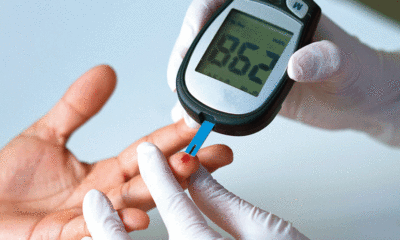Diabetology
Stress Reduction Techniques for Better Blood Sugar Control
Published
1 year agoon
By
Robert
Stress, a ubiquitous element of modern life, can significantly impact our health. While short-term stress can be beneficial, chronic stress can lead to various health issues, including impaired blood sugar control. For individuals with diabetes or prediabetes, managing stress is crucial to maintaining stable blood glucose levels. This article delves into the relationship between stress and blood sugar, explores effective stress reduction techniques, and offers practical advice for integrating these methods into daily life.
Understanding the Connection Between Stress and Blood Sugar
- The Physiological Impact of Stress
- Stress Response Mechanism: When stressed, the body releases hormones like cortisol and adrenaline. These hormones prepare the body for a “fight or flight” response, increasing blood glucose levels to provide immediate energy.
- Chronic Stress: Prolonged stress keeps cortisol levels elevated, leading to sustained high blood glucose levels and insulin resistance over time.
- Effects of Chronic Stress on Diabetes
- Increased Blood Sugar Levels: Chronic stress can lead to persistent hyperglycemia, complicating blood sugar management for individuals with diabetes.
- Insulin Resistance: Continuous exposure to stress hormones can reduce the body’s sensitivity to insulin, making it harder to regulate blood sugar levels.
- Behavioral Changes: Stress often leads to unhealthy behaviors such as poor diet, lack of exercise, and inadequate sleep, further exacerbating blood sugar issues.
Effective Stress Reduction Techniques
- Mindfulness and Meditation
- Mindfulness Practices: Techniques like mindful breathing, body scans, and mindful eating can help individuals stay present and reduce stress.
- Meditation: Regular meditation practice, including guided, transcendental, or loving-kindness meditation, can lower cortisol levels and improve emotional well-being.
- Scientific Evidence: Studies show that mindfulness and meditation can significantly reduce stress and improve blood sugar control in people with diabetes.
- Physical Activity
- Exercise as a Stress Reliever: Physical activity helps reduce stress by releasing endorphins, improving mood, and lowering cortisol levels.
- Types of Exercise: Aerobic exercises (running, cycling), strength training, yoga, and tai chi are all effective in reducing stress and improving blood sugar control.
- Consistency and Variety: Regular exercise, tailored to individual preferences and capabilities, is essential for long-term stress management.
- Breathing Techniques
- Deep Breathing Exercises: Practices like diaphragmatic breathing, 4-7-8 breathing, and alternate nostril breathing can quickly reduce stress and lower blood sugar levels.
- Incorporating Breathing Techniques: Simple breathing exercises can be done anytime, anywhere, making them a practical tool for managing acute stress.
- Healthy Eating and Nutrition
- Balanced Diet: Consuming a diet rich in whole grains, lean proteins, healthy fats, and plenty of fruits and vegetables can stabilize blood sugar and reduce stress.
- Avoiding Stress-Inducing Foods: Limiting caffeine, sugar, and processed foods can prevent stress-related blood sugar spikes.
- Mindful Eating: Paying attention to hunger cues and eating mindfully can reduce stress and improve digestion.
- Sleep Hygiene
- Importance of Quality Sleep: Adequate sleep is crucial for stress reduction and blood sugar control. Poor sleep increases cortisol levels and can lead to insulin resistance.
- Improving Sleep Hygiene: Establishing a regular sleep schedule, creating a comfortable sleep environment, and avoiding screens before bed can enhance sleep quality.
- Addressing Sleep Disorders: Seeking medical advice for conditions like sleep apnea can improve overall health and blood sugar management.
- Time Management and Organization
- Prioritizing Tasks: Effective time management can reduce stress by helping individuals feel more in control of their daily activities.
- Setting Realistic Goals: Breaking tasks into manageable steps and setting achievable goals can prevent feeling overwhelmed.
- Organizational Tools: Using planners, to-do lists, and digital apps can streamline tasks and reduce stress.
- Social Support and Connection
- Building a Support Network: Connecting with family, friends, and support groups can provide emotional support and reduce stress.
- Talking About Stress: Sharing feelings and concerns with trusted individuals can alleviate stress and provide new perspectives on managing challenges.
- Community Involvement: Engaging in community activities and volunteering can foster a sense of belonging and purpose.
- Professional Help and Counseling
- Seeking Therapy: Professional counseling or therapy can provide tools and strategies for managing stress.
- Cognitive Behavioral Therapy (CBT): CBT is particularly effective for changing negative thought patterns and reducing stress.
- Stress Management Programs: Participating in structured stress management programs can provide comprehensive support.
- Relaxation Techniques
- Progressive Muscle Relaxation (PMR): This technique involves tensing and then relaxing each muscle group, reducing physical tension and stress.
- Visualization and Guided Imagery: These practices use mental images to promote relaxation and reduce stress.
- Massage Therapy and Acupuncture: These therapies can help reduce physical tension and promote relaxation.
- Hobbies and Leisure Activities
- Engaging in Enjoyable Activities: Hobbies and leisure activities can provide a mental break from stress and improve overall well-being.
- Creative Outlets: Activities like painting, writing, or playing music can be therapeutic and stress-reducing.
- Nature and Outdoors: Spending time in nature has been shown to reduce stress and improve mood.
Integrating Stress Reduction Techniques into Daily Life
- Creating a Routine
- Consistency: Establishing a regular routine for stress reduction activities ensures they become a habitual part of daily life.
- Flexibility: Allowing some flexibility in the routine can prevent it from becoming another source of stress.
- Setting Realistic Expectations
- Small Steps: Start with small, manageable changes and gradually incorporate more techniques.
- Patience and Persistence: Stress reduction takes time, and consistent practice is key to seeing long-term benefits.
- Monitoring Progress
- Tracking Stress Levels: Keeping a journal or using stress tracking apps can help monitor progress and identify effective techniques.
- Adjusting Strategies: Be open to trying different techniques and adjusting strategies based on what works best.
Conclusion
Effective stress management is crucial for maintaining stable blood sugar levels and overall health. By understanding the connection between stress and blood sugar, and integrating various stress reduction techniques into daily life, individuals can achieve better blood sugar control and improve their quality of life. Regular practice, consistency, and a holistic approach to stress management are essential for long-term success.
You may like
-


Diabetes Management: Effective Strategies to Control Blood Sugar Naturally
-


Essential Lifestyle Tips for Preventing Diabetes Complications
-


Importance of Regular Blood Sugar Monitoring
-


Stress Management Emerging as Essential Part of Diabetes Care
-


WHO Issues New Guidelines for Better Diabetes Management in 2025
-


Smart Strategies for Controlling Blood Sugar Naturally
The Latest News
- Best Lifestyle Changes to Lower Stress and Balance Blood Sugar Naturally
- Best Morning Routine for Diabetics: A Complete Guide
- Diabetes Management: Effective Strategies to Control Blood Sugar Naturally
- Best Morning Routines for People with Diabetes
- Essential Lifestyle Tips for Preventing Diabetes Complications
- Diabetes Awareness in Children: Early Habits That Matter
- Importance of Regular Blood Sugar Monitoring

Best Lifestyle Changes to Lower Stress and Balance Blood Sugar Naturally

Best Morning Routine for Diabetics: A Complete Guide

Diabetes Management: Effective Strategies to Control Blood Sugar Naturally

Lung growth invading Treg have different transcriptional profiles and capability connected to designated spot bar reaction

Psoriasis be treatment by adjuvant Salicylic acid, ceramides as this containing lotions

